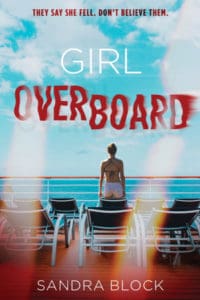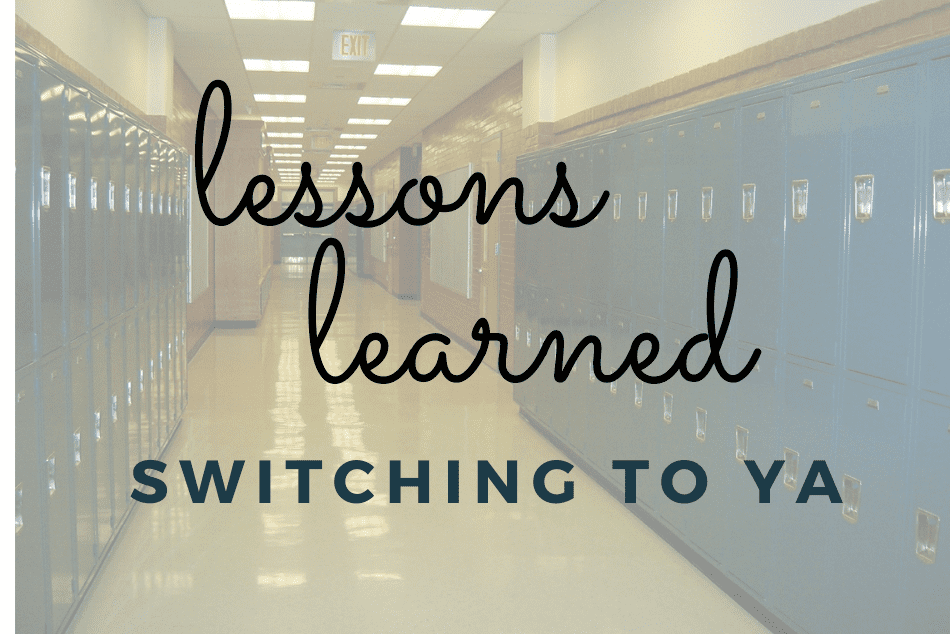by Sandra Block
I became a Young Adult writer by accident.
That probably needs some explaining.
“Accident” may be an overstatement. I was, after all, writing adult suspense quite purposefully. But the transition was truly a stroke of luck, mixed with a little bit of hustle. This opportunity for this book deal fell in my lap—or more correctly, was placed there by my agent. She shot off an email which off-handedly asked, “Do you happen to have any YA thriller ideas?” She knew of an imprint looking to add some good thrillers to their line.
What followed was a crash course in shifting to YA.
-
Don’t be afraid to try something new.
I’ve learned that the answer to this type of question is always yes. So I threw together five YA thriller ideas. One of them almost didn’t even make it to the list—I worried it was too cheesy to pitch a death on a cruise ship. But what I envisioned was no Agatha-Christie Death on the Nile affair. More like Death on the Royal Caribbean, in the midst of all-you-can-eat-buffets, Broadway-style theater, lame teen-age programming and overpriced off-shore excursions (perhaps you can tell I’ve been on a few cruises). Anyway, I had four other more respectable thriller ideas, so I figured it couldn’t hurt to add this one, just for fun.
-
Consider teen limitations to key elements of adult fiction—and find workarounds.
Of course, they loved the cruise one. And they were right. A cruise, it turns out, is a perfect YA vehicle. The writer doesn’t have to worry about kids being driven anywhere, or somehow taking them away from their omni-present parents to drive the plot. On a cruise, adults can let their teenagers roam free in a mini “city.” The kids can test independence, without getting into too much trouble. (Until, of course, trouble is exactly what your thriller calls for.)
“Can you just quick write 20 pages,” my agent asked, “and we’ll send it in?”
-
See if the YA voice comes naturally.
Just so you know…this is not how I work. I’m think-a-tive. I put my chin in my hand a lot and stare up at my quill. But, again, the answer is always yes. So I hunkered down. And luckily, the protagonist Izzy, a geeky, smart-ass teenager just started talking. We submitted the pages, and a few days later, we had a deal.
So, I became a YA novelist because I answered an email.
Looking back, I can see the switch to YA was not entirely accidental though. The “young adult” seeds were already planted in all my previous novels.
-
Be true to your school.
I’m a doctor by training, and a catch phrase we sometimes use as a patient descriptor is “patient appears older than stated age.” This usually means someone in poor health, perhaps from heart failure or other illness. In my case, all of my adult fiction protagonists have “appeared younger than stated age.”
My debut, Little Black Lies, kicked off a trilogy centered on Zoe Goldman, a psychiatrist in-training with ADHD. She was around 25, so not young adult. She has even skated past the elusive lesser-known category “new adult.” But, medical residents are really in a prolonged adolescence (which I can say, because I was one.) You are on a lengthier-than-normal prescribed track: college, medical school, residency. Someone dictates what you do and when you do it, and with no time leftover to earn your keep (yet), your bills are handled by either parental assistance or loans.) Your job just to fill your brain with knowledge and try not to kill anyone.
Zoe was a bit of a hot mess, if I’m honest. She was a psychiatrist seeing her own psychiatrist. And between her family struggles, anxiety, and scattered thoughts, she barely kept it together in the residency program. Her voice sounded young, because she still felt young.
My adult stand-alone thriller What Happened That Night is told from the perspective of a just-past new-adult as well. The trauma of her college experience has left her emotionally stunted. The “before” scenes occur in college, and the “after” scenes in her job five years later.
Her romantic interest and partner-in-crime has Aspergers, and has struggled throughout his life with perplexing social skills, especially after college. So he too felt younger than his stated age.
For me, going YA did not require dropping from middle age to teenagers. It meant turning the clock back about 10 years. Instead of the years surrounding college or medical school, it was high school.
When I shared the publishing news with my beloved sisters in the Tall Poppy Writers’ group, one of the members commented: “my heart tells me YA thriller is what you were born to write.” That struck a chord in me. Sometimes opportunities come to you for a reason.
Soon, you (and your favorite teen readers!) can join me on the cruise ship in Girl Overboard, feast on Baked Alaskan, watch a “Rockette’s-style” show, and snorkel on a cruise-owned beach.
But be careful, because there might just be a murderer on board…
Have you thought about writing for a different audience of readers? Visit Career Authors on Facebook to join our discussion.

 Sandra A. Block graduated from Harvard, then returned to her native land of Buffalo, N.Y., for medical training and never left. She is a practicing neurologist and proud Sabres fan, and lives with her husband, two children, and impetuous yellow lab. Her work has been published in The Washington Post. She is the author of the adult thrillers Little Black Lies (a finalist in the International Thriller Awards), The Girl Without a Name, The Secret Room, and What Happened That Night. Girl Overboard is her first YA thriller.
Sandra A. Block graduated from Harvard, then returned to her native land of Buffalo, N.Y., for medical training and never left. She is a practicing neurologist and proud Sabres fan, and lives with her husband, two children, and impetuous yellow lab. Her work has been published in The Washington Post. She is the author of the adult thrillers Little Black Lies (a finalist in the International Thriller Awards), The Girl Without a Name, The Secret Room, and What Happened That Night. Girl Overboard is her first YA thriller.





